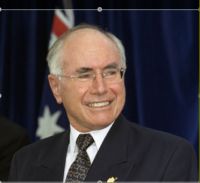Australia's government not to apologize to released Indian doctor
The Prime Minister of Australia announced Monday that Australia's government would not apologize to an Indian doctor who was held for about a month on terror charges that were dropped for lack of evidence afterwards.

Mohamed Haneef came back to his wife and newborn daughter in his hometown of Bangalore, India over the weekend after spending 25 days in Australian jail on a charge of supporting last month's failed attacks on London and Glasgow, Scotland.
The 27-year-old doctor was allowed to return home after the nation's top prosecutor on Friday dropped the charge because of a lack of evidence. But the immigration minister said he will not reverse his earlier decision to revoke Haneef's working visa.
Defense lawyer Peter Russo said Monday he still had plans to appeal the minister's decision to strip Haneef of his visa in the Federal Court on Aug. 8. He also indicated that Haneef may be planning to sue the Australian government, and suggested officials should consider issuing an apology.
"He is not expecting one (an apology) but I guess if the people who are in line for being sued want to mitigate their losses they might want to think about apologies," he told the Australian Broadcasting Corp. radio from India.
Prime Minister John Howard shrugged off the suggestion.
"Australia will not be apologizing to Dr. Haneef," Howard told reporters in Sydney. "Dr. Haneef was not victimized and Australia's international reputation has not been harmed by this 'mis-start' to its new anti-terrorism laws."
Haneef had been charged with providing reckless support to a terrorist organization because he gave his cell phone SIM card to one of his second cousins, Sabeel Ahmed, when he left Britain in July last year.
British police have charged Ahmed, 26, with withholding information that could have prevented an act of terrorism. His brother, Kafeel Ahmed, is believed to have set himself ablaze after crashing an explosives-laden Jeep into Glasgow Airport in Scotland and remains in hospital with critical burns.
Meanwhile, Immigration Minister Kevin Andrews said he was standing by his decision to strip Haneef of his visa, saying he relied on secret police information that would be revealed when the case goes to court.
"The cancellation of the visa was on character grounds, and what the legislation provides is that there is a reasonable suspicion ... this man has had associations with people engaged in criminal conduct," he told ABC radio. "Hopefully when people see the further information ... they'll be able to see that there are more circumstances which haven't been made available to them to date."
Subscribe to Pravda.Ru Telegram channel, Facebook, RSS!





